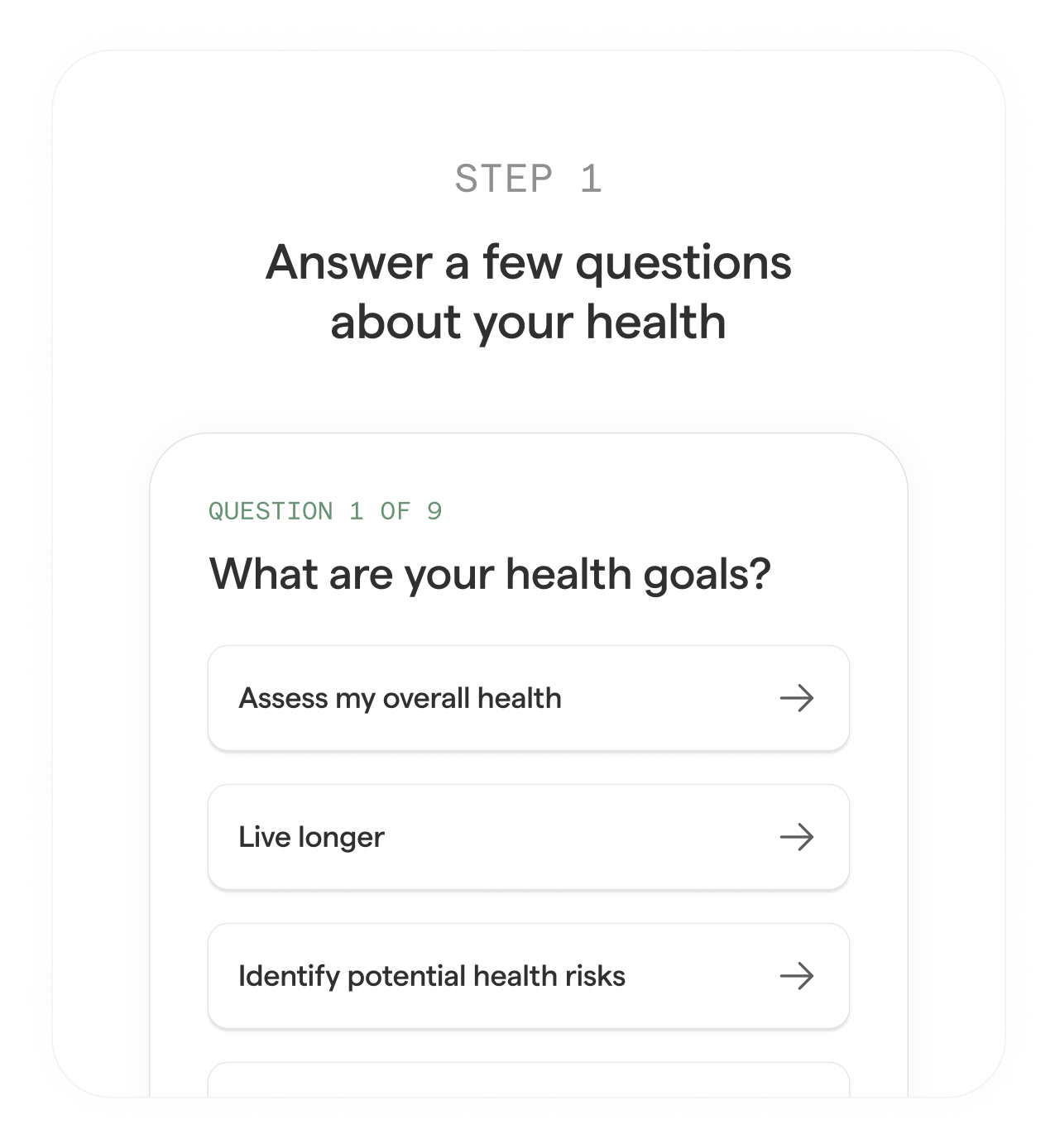- Hemoglobin A1cHbA1c measures your average blood sugar over the last 2–3 months. It helps diagnose and monitor diabetes and overall blood sugar control.
- Glucose (fasting)Fasting glucose measures blood sugar after 8 hours without food. High levels may indicate prediabetes, diabetes , or impaired glucose regulation.
- Insulin (fasting)Fasting insulin shows how much insulin your body makes to manage blood sugar. High levels often indicate insulin resistance or early metabolic issues.
- Low Density Lipoprotein (LDL) CholesterolLow Density Lipoprotein (LDL), often called “bad cholesterol,” carries cholesterol to your arteries. High levels can contribute to plaque buildup in arteries and increased risk of heart attack and stroke.
- Lipoprotein (a)Lipoprotein(a) is a type of LDL particle, often called "bad cholesterol.” Elevated levels are linked to an increased risk of genetic heart disease and can contribute to plaque buildup in arteries, even when other cholesterol levels are within the normal range.
- Apolipoprotein B (ApoB)Apolipoprotein B (ApoB) is a protein found in LDL particles that carry cholesterol in the blood. High levels can contribute to plaque buildup in arteries and heart disease.
- High-Density Lipoprotein (HDL) CholesterolHigh-Density Lipoprotein (HDL) cholesterol, often called “good cholesterol” removes excess cholesterol from your bloodstream. Higher levels help protect against heart disease and improve cardiovascular health.
- Cholesterol/HDL RatioThis ratio compares total cholesterol to HDL. A higher ratio may reflect greater cardiovascular risk, while a lower ratio supports healthy heart function.
- Total CholesterolTotal Cholesterol sums LDL, HDL, and other lipids in your blood. High total cholesterol can signal an increased risk of heart disease.
- TriglyceridesTriglycerides are fats in your blood that store energy. High levels are linked to heart disease, diabetes, and metabolic syndrome.
Optimize your health and live longer

Get a full picture of your health

Comprehensive care at an accessible price
- Annual Essentials test
- Tests heart and metabolic health
- 5+ biomarkersView
- Dedicated healthcare practitioner
- Annual Complete test
- Heart, kidney, liver health and more
- 35+ biomarkersView
- Biological age
- Dedicated healthcare practitioner
- 2 Ultimate tests per year
- Tests everything in Complete and more
- Biological age
- Dedicated healthcare practitioner
- Video consults to review results

Created by leaders in longevity medicine
The design of our program benefits from Dr. Hui's deep expertise and vast clinical experience.


Test from the comfort of your home

Comprehensive testing made simple



Trusted by over 1 million Canadians
A health test like no other
Optional add-on tests for key health concerns
- STIsUsed to diagnose diabetes. Detects if blood sugar levels remain high after an extended period without sugar. Levels above 5.9 mmol/L are considered abnormal.
- Female FertilityUsed to diagnose diabetes. Detects if blood sugar levels remain high after an extended period without sugar. Levels above 5.9 mmol/L are considered abnormal.
- Male FertilityUsed to diagnose diabetes. Detects if blood sugar levels remain high after an extended period without sugar. Levels above 5.9 mmol/L are considered abnormal.
Frequently asked questions about Longevity
Longevity
What are biomarker tests used for?
Practitioners in Canada often use blood biomarker testing as a method to identify disease or condition indicators within your body. Blood biomarker testing can help your practitioner assess your risk for developing certain types of diseases.
These blood lab tests can empower you to take preventative measures against these conditions, as well as make early interventions if signs or symptoms begin to appear. It can also be beneficial in helping your practitioner diagnose conditions as early as possible.
Not only that, blood biomarker testing is an invaluable tool for identifying opportunities to optimize your overall health strategies and habits, so that you can maximize longevity in the future.
Together, these insights can make it easier for your practitioner to find effective short- and long-term treatment options to manage certain conditions, which could otherwise begin impacting your quality of life.
Interested in biomarker blood testing for longevity? Start your assessment today!
What do blood biomarker tests show?
There are a number of different health factors that blood marker testing demonstrates. Markers can show changes happening in your body, help diagnose or monitor conditions that are developing, evaluate and track your organ function, as well as determine how effectively treatments are working.
Some of the different longevity biomarker tests in Canada that can be performed through Felix include:
- Vitamin and mineral deficiency blood tests, such as ferritin (iron-storage levels)
- Heart health blood tests (i.e., cardiovascular risks, blood cholesterol test kits, etc.)
- Metabolic health, including diabetes and prediabetes screenings
- Kidney and liver health testing
Over all, these longevity biomarkers can provide useful insights about what your biological age is, and if there are any opportunities to further optimize your health. This can be an invaluable resource for your practitioner to provide you with a preventative health assessment that’s uniquely catered to your personalized needs.
What tests are included with Felix Longevity?
This really depends on the tier of blood biomarker testing that you’re choosing, because it will vary by each tier.
Felix is currently offering 3-tiers of longevity biomarker testing:
- Essentials:
- Heart and metabolic health-focused
- Includes 5+ blood biomarker testing
- Follow-up with a dedicated healthcare practitioner.
- Complete:
- Annual Complete test
- Heart, liver, kidney health, and more!
- 35+ biomarker tested
- Biological age
- Follow-up with a dedicated healthcare practitioner
- Ultimate (coming soon):
- 2 Ultimate tests per year
- Tests everything in Complete and more
- Biological age
- Follow-up with a dedicated healthcare practitioner
- Video consults to review your results
SIDE NOTE: It’s important to note that Felix’s Longevity test is available in Ontario. At-home collection for blood biomarker testing through Felix is currently only available in Ontario. If you’re interested in at-home lab testing in Ontario, you can click here to submit your health assessment, then select ‘at-home testing’ from the options listed.
How do I know what my biomarker results mean?
The good news is, you won’t have to figure out your results on your own. Your clinician will review all your results with you once they are available.
Based on the results of your testing, your practitioner will create a custom-tailored treatment plan that could include lifestyle changes, supplements, or prescription medications that are designed to help you meet your health goals and improve or maintain your overall health.
If you’re interested in requesting blood biomarker testing through Felix, you should complete your assessment to request blood biomarker testing in Canada.
For further assistance, feel free to click the chat button in the bottom right corner of your screen to talk to one of our friendly representatives.
How accurate will my results be?
In most cases, biomarker blood testing is very accurate, especially when it's reviewed by your practitioner alongside other important clinical information (i.e., your medical history, etc.).
It is important to remember that in-person or at-home lab tests like biomarker testing in Canada only provide a snapshot of your current health status. Ongoing testing may be required to oversee a condition that has already presented and requires treatment or management.
Can I request a blood test without seeing a practitioner?
In order to request a longevity blood test, you will need to chat with a practitioner. The healthcare practitioners at Felix have the knowledge and experience in order to guide you through your results and your treatment plan based on your unique needs, goals, and lifestyle.
Interested in longevity blood lab testing through Felix? Fill out your assessment today.
What blood tests check heart health?
Felix’s longevity biomarker blood tests will check your heart health, by helping to identify potential risk factors (i.e., high cholesterol) that could pose major health concerns later if left unaddressed.
Regardless of which tier you choose, all 3 tiers available in our longevity program will include heart health blood testing for these types of cardiovascular risks.
Want to get started requesting longevity biomarker blood testing from Felix? Complete your online assessment today.
Which biomarkers are included in the Felix Longevity test?
At Felix, we test 35+ essential biomarkers to monitor your heart, kidney, and liver health, vitamin and nutrient balance, inflammation and more. See all markers here.
As part of your longevity results, you’ll also receive your biological age alongside your blood biomarker lab results. We use Levine’s Phenotypic Age to calculate this, which is a measure of biological age blood markers that were developed by Dr. Morgan Levine and their colleagues.
To determine your biological age, we combine 9 common clinical biomarkers, including:
- Albumin
- Creatinine
- Glucose
- C-reactive proteins
- Several other blood cell measurements
Using a mathematical model, this information is combined along with your actual age to calculate your biological age. We also test a range of longevity biomarkers for your heart, kidney, and liver health, as well as vitamin and nutrient balances.
Together, all this information gives your practitioner the information they need to provide you with a preventative health assessment, as well as recommendations on lifestyle changes that can help you live longer and healthier.
Online Visits
How does the visit work?
After creating an account, you will complete a medical assessment for evaluation by one of the Felix healthcare practitioners.
During your assessment, you will have the opportunity to send your practitioner questions via secure messaging.
In most cases, practitioners will complete your assessment with secure messaging alone but sometimes they may determine you require an audio or video visit and/or further diagnostic testing to help determine the best treatment plan for you.
If your practitioner has determined a prescription treatment is appropriate, they will approve your visit and write you a prescription. Our pharmacy will then ship your prescription to your home.
You’ll be able to message your healthcare practitioner if you have questions or want to make changes to your treatment at any time.
Do I need to complete my online visit at a scheduled time?
No. We use an asynchronous telemedicine model so you can complete your online visit in your own time and we save your progress so you can come back later to finish it.
If you are completing a visit in the mental health or weight loss categories, your healthcare practitioner may require a phone or video call to discuss your medical profile further during the assessment process.
Does the online visit require a phone or video appointment?
Most assessments do not require a phone or video conversation. Once a prescriber has reviewed the info in your assessment they will respond to you via secure instant messages that you can access within your Felix account.
If you are completing a visit in the mental health or weight loss categories, your healthcare practitioner may require a phone or video call to discuss your medical profile further during the assessment process.
How quickly will a healthcare practitioner review my online visit?
You can expect to receive a response from a healthcare practitioner within 24 hours of submission. If you’ve been waiting longer than this, please reach out to our Patient Support team through the chat bubble in the bottom right corner of your account or our Contact Us page.
Can I just get the treatment and skip the online visit?
No. A visit with a licensed healthcare practitioner is required for all treatments currently provided through Felix’s service.
Shipping
How long will it take to get my treatment?
Not long. After completing your assessment, a practitioner will generally respond within 24 hours, and often much sooner.
Treatment plans will be processed within 2-4 business days of your approval date if there is nothing blocking fulfillment.
All packages are shipped via Express Post, which usually takes 2-3 business days. You will receive an email with your tracking number once your treatment has been shipped.
Is your packaging discreet?
Absolutely. All Felix shipments arrive in a nondescript blister package so you can have your treatment shipped wherever makes sense for you as long as there is someone there to sign for it.
Do I have to be home to receive my package?
A signature upon delivery may be required.
How much does it cost to ship my treatment?
There is currently no cost to have your treatment shipped to you from our Felix Pharmacy network.
Insurance
Am I covered by my insurance?
Treatment coverage varies greatly between different insurance plans.
The good news is that if you are covered, Felix can bill your insurer directly, and then process your treatment plan at no additional cost to you. We recommend that you upload your private and/or provincial benefit card during the online visit so that our pharmacy partner can apply any coverage you are eligible for before processing your treatment plan.
Insurance coverage for treatment plans through Felix doesn't include the cost of your visit.
Is the online visit covered by my insurance or provincial health plans?
A Felix online visit is considered asynchronous since it is conveniently completed through a secure chat bases system. Currently, asynchronous visits are not covered by insurance or provincial health plans so you will be charged a visit fee, depending on the category of treatment you are requesting.
Is the medication covered by my insurance or provincial health plans?
Medication coverage varies greatly between different plans, provinces, and has specific criteria that determine eligibility. For private insurance, we recommend contacting your benefits administrator with your details and the Drug Identification Number (DIN) and the drug name to determine your coverage.
For more details on provincial health plan coverage see below:
Alberta: Learn more about AHCIP here. Search for covered drugs here.
British Columbia: Learn more about MSP here. Search for covered drugs here.
Manitoba: Learn more about MHSIP here. Search for covered drugs here.
Newfoundland and Labrador: Learn more about MCP here. Search for covered drugs here.
Nova Scotia: Learn more about MSI here. Search for covered drugs here.
Ontario: Learn more about OHIP+ here. Search for covered drugs here.
Prince Edward Island: Learn more about Health PEI here. Search for covered drugs here.
Saskatchewan: Learn more about Saskatchewan Health Coverage here. Search for covered drugs here.
Is birth control covered by OHIP in Ontario?
OHIP+ covers some birth control for eligible residents of Ontario who are under 25 years old and do not have private insurance. You can check if your birth control medication is covered here. Make sure to upload your Ontario health card during your online visit so our pharmacy partners can apply your coverage directly.
Felix 101
What is Felix?
Felix is Canada’s first truly integrated healthcare platform. We provide on-demand treatment for everyday health needs like weight loss, mental health, sexual health, and more. Founded in 2019, our digital-first approach to healthcare includes everything from diagnosis to prescription — all accessible from the comfort of home.
Does Felix replace my doctor?
No. Felix provides a faster, hassle-free way for you to get a treatment plan for certain conditions, but our service does not replace your primary care provider. For matters that extend beyond obtaining a lifestyle treatment safely and easily, we encourage you to consult your primary health practitioner in person — whether for checkups, personal health concerns, or to inform them about your current treatments or treatment plans.
Can I be accurately assessed remotely?
Absolutely. Our online assessments have been designed to ask all the necessary questions required for diagnosis. We've worked with specialists to create an assessment process that can provide sufficient information for the healthcare practitioner to determine whether or not you are eligible for a prescription and craft an appropriate treatment plan.
It's an emergency. What do I do?
Call 911 or proceed to your nearest emergency room immediately. Felix is not intended for medical emergencies. Once the emergency has been addressed or resolved, contact your prescribing practitioner to inform them of your experience as this may impact your current treatment plan.
Who can use Felix?
Anyone who is 18 years or older older (16 or older for acne and birth control prescriptions), and is located in Alberta, British Columbia, Manitoba, Newfoundland and Labrador, Nova Scotia, Prince Edward Island, Saskatchewan or Ontario. We cannot ship treatments outside of these provinces at this time.
Our Healthcare Practitioners
How do I communicate with my Felix practitioner?
Your Felix practitioner will message you via secure instant message. You’ll receive an email when you have a new message and can respond to these from within your Felix account.
Can I see the same Felix practitioner after my initial assessment?
You will have the ability to chat with your designated Felix practitioner for the entirety of your prescription length. When your prescription is nearing completion, we will email you to submit a checkup visit so one of our prescribers can renew your prescription.
Our matching system is based on availability, so we can’t guarantee you’ll be paired with the same healthcare practitioner at your renewal visit.
Who are the practitioners that will be reviewing my online visit?
They are all licensed, real Canadian healthcare practitioners! All online visits submitted via Felix are reviewed by them and they must be licensed in your province to prescribe you the medication. It is these healthcare practitioners, and not Felix, who determine whether or not to write you a prescription, as well as the appropriate dosage (where applicable).
What does your medical team do?
Our medical team and board members help oversee each of our treatments to ensure our medical assessments are thorough, safe, personalized, and provide best-in-class care. Our pharmacists provide treatment support through medication counselling and education.









